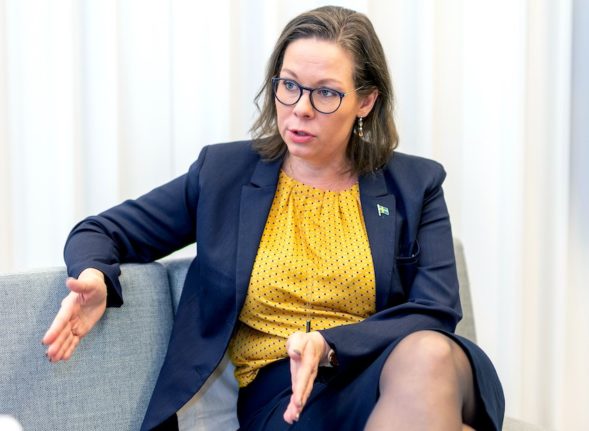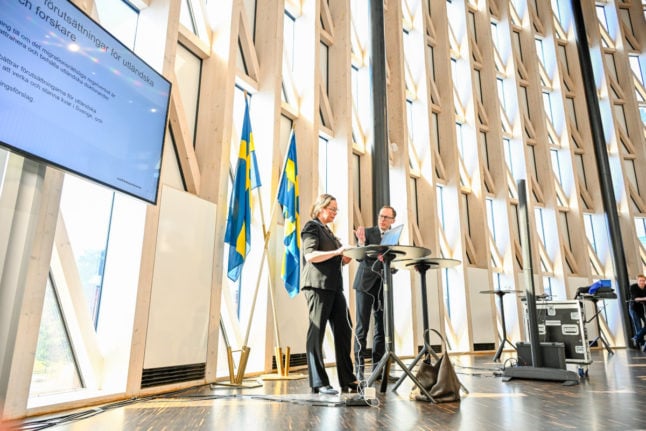“The government’s idea is that permanent residency will be phased out for those who are related to asylum immigration. That means asylum seekers and their relatives, for instance, but not for workforce migration,” she told SR’s English language wing Radio Sweden.
She said the coming inquiry into how to convert existing permanent residencies into citizenships would also only focus on asylum-related migration cases, and not on those here on work permits.
READ ALSO: What do we know about Sweden’s plans to withdraw permanent residency?
“But I think if you come here and you intend to stay, then there should be an ambition to learn the Swedish language, have knowledge about the society, be able to support yourself, and, after maybe eight to 10 years, become a citizen and become a full part of the Swedish society. And that is an important signal to send.”
Malmer Stenergard said that she wanted to make handling times shorter for those with work permits.
“We want to focus on the highly skilled workforce coming to Sweden, and improve the rules to make handling times shorter,” she said. “We know that is a great problem for those who apply for work permits and also for those who apply for a prolongation of work permits. We are set on improving the rules so that it will be more attractive to come to Sweden.”
She said that the new government recognised that the long delays faced by those seeking to secure work permits were a major issue.
“This is a huge problem and I’m really afraid that talented people will hesitate to come to Sweden because of this,” she said. “I’ve read [in the] news today about a girl leaving Sweden because the prolongations didn’t work. So we will look into how can we make the authorities work in a more effective way. That is one thing we can do. And the other thing we can do is take a closer look at the legislation and see if there are things that we can change in order to improve [things] for those who want to come here as skilled workers.”
PhD students graduating in Sweden have been severely affected by the requirement that came in in 2021 they need to secure a work contract of more than 18 months in duration to be eligible for permanent residency.
Malmer Stenergard told SR that the government was “well aware of how the changes have affected these students and of course the universities”, and had agreed in the Tidö Agreement to look into what changes might be needed to make it easier for them to get permanent residency.
When it comes to the bill passed in the parliament last week to raise the minimum salary threshold for work permits, Stenergard said that it was not yet certain that the threshold would be set at the median wage — about 33,000 kronor — which was mentioned in the Tidö Agreement, and that anyway, the government would exclude some groups from the change.
“I don’t think that they should be worried,” she said. “We will look into the exact amount, but we will also be able to make exceptions for some individual professional groups.”
However, she said that the government was convinced that raising the threshold would help get unemployed people already living in Sweden into work.
“I think it is important that we focus more on highly qualified workforce migration, and that people who are already in the country actually apply for the jobs that are available in the lower income groups, and therefore we have to create higher incentives in the economical systems for those people to actually apply for the jobs and educate themselves.”
She pushed back at the idea that Sweden’s new government was anti-immigration, saying that the aim was to slow down immigration so that the country was better able to integrate migrants who have already come.
“I think that we have a huge job ahead of us to make integration work,” she said. “That is why we say that for now, we have to have asylum immigration at a minimum. But Sweden is relying on immigrants, and the skilled people who come here are extremely important for Swedish society and also for Swedish companies in order to be able to compete in a global market.”
“So I want to be very clear that people who come here and contribute to Swedish society and to Swedish companies and Swedish development are more than welcome.”



 Please whitelist us to continue reading.
Please whitelist us to continue reading.
Yeah, right. Populism all the way still. Now after noticing the backlash, they back up on their original plan. Oh she red a story online about a girl who could not renew her permit. Boo-hoo! What about the hundreds of other stories that have been on the news non-stop? Very bizarre how she now has a change of heart.
Also, the unions always had to agree to salaries for every single work application to make sure it meets the average pay within the field. There already is a way to determine appropriate pay for work permit applies… raising this to a potential 33k mark is meant to keep immigrants out in general. There already is a system to make sure immigrants are not hired for nickles! But as usual, everyone involved in migration politics doesn’t seem to know much about the process.